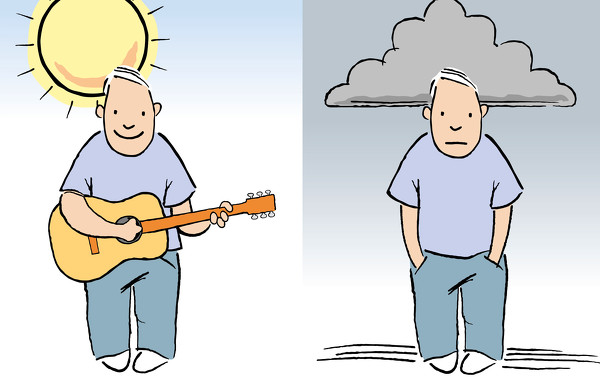Wednesday, November 10th, 2021
There Goes The Sun
Darker days bring on major mood disorder
By Erin Gardner

Photo by Bill Thornbro/The Daily Standard
Now that the temperature is colder and sunshine is waning, many people will experience seasonal affective disorder, or SAD.
CELINA-Now that the temperature is colder and sunshine is waning, many people will experience seasonal affective disorder, or SAD, said Amber Smith, owner of Sanctuary of Hope, a St. Marys-based provider of counseling and mental healthcare for women.
SAD often starts in the fall and may continue through winter, with symptoms such as fatigue, depression, hopelessness and social withdrawal, according to Mayo Clinic. Smith said she typically sees more patients after the holidays. "It's essentially depression, but it's characterized by the seasons. Obviously, we know it related to the winter season and so it's correlated; the depression symptoms pick up," Smith said. "(The symptoms) start to present themselves in the fall and then as we progress into winter, they get more severe typically. It can actually happen spring to summer, as well. You just don't hear about that as often."
Roberta Donovan, Foundations Behavioral Health Services clinical director, agreed that SAD is weather-dependent.
"Seasonal affective disorder…usually starts about late-October, beginning of November and will go through until about March. When you talk about seasonal affective disorder, it's usually about the time that the time changes," Donovan said.
Those who experience SAD exhibit common symptoms of depression, such as a steady, depressed mood, sleeping or eating too much or too little, weight changes, feeling sluggish or unmotivated and losing interest in daily activities, Smith said.
"There's problems with concentration, feeling hopeless, worthless, guilty, and then in the most severe form, thoughts of death and suicide," Smith continued.
She also advised that people pay attention to their mood fluctuations as declining energy levels are a tell-tale sign of depression.
"I would say losing some motivation as well, so your drive to get up and want to start your day and want to do all the things you had planned, that starts to decrease a bit too," Smith said. "It's really kind of looking at what your typical self is like and if any of that starts to change, that is when I…start to pay attention a little bit more."
For those who have major depression and also experience SAD, their symptoms are likely to worsen in severity, frequency or both, so it's essential to be self-aware, Smith said.
Just like depression, SAD can be treated and managed.
Smith recommends walking, vitamin D supplements, light therapy, counseling and medication.
"Females tend to get this disorder more than men as well and (females) tend to be deficient in vitamin D in the Midwest," she noted. "I always recommend obviously going to your general physician and verifying whether you have a vitamin D deficiency, but a lot (of women) do.
"They say that the further away from the equator that you live, the higher your chances are of getting (SAD). I believe and I've read in articles and such that it's related to vitamin D," Smith added. "Obviously the further away that we're from the equator, the less the sun comes out in the wintertime and…with the cold especially, we don't get out as much as what we do in the summertime to get that sunlight that gives us vitamin D."
Because of the lack of vitamin D, Smith and Donovan recommend phototherapy, or light therapy.
The treatment option entails a person sitting in front of a bright light box every day for 30-45 minutes, usually in the morning, from fall to spring.
"The light boxes, which are about 20 times brighter than ordinary indoor light, filter out the potentially damaging UV light, making this a safe treatment for most," according to the National Institute of Mental Health.
With the holidays quickly approaching, Donavon warns people about alcohol and recreational drug use, saying such substances can actually compound the symptoms of SAD.
"Alcohol is a depressant, and if you're already feeling down, people will sometimes use alcohol in the hopes that it brings them up or makes them feel better and it can have the exact opposite effect," she said.
For those experiencing depression or SAD and aren't sure where to turn, Donavon encourages them to seek out counseling.

